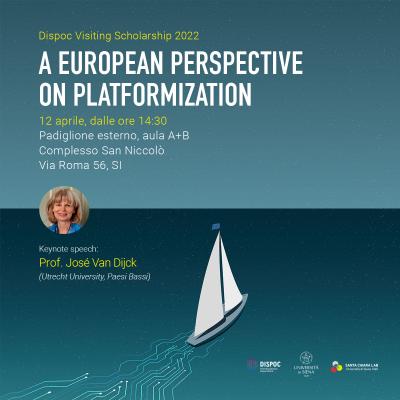
Quando: martedì 12 aprile 2022 ore 14:30 – 16:30
Dove: Santa Chiara Lab, Via Val di Montone, 1, Siena
Il seminario fa parte del programma di visiting scholarship del progetto di eccellenza del Dispoc.
"A European Perspective on Platformization" – José Van Dijck (Utrecht University)
La prof.ssa José Van Dijck sarà in visita presso il nostro dipartimento dal 4 al 25 aprile.
Nota biografica:
José Van Dijck is a distinguished university professor at the University of Utrecht (The Netherlands); she was the president of the Royal Netherlands Academy of Arts and Sciences from 2015 until 2018. She was a visiting professor at MIT (USA), University of Toronto (CAN), Stockholm University (SWE) and University of Technology, Sydney (AUS). She received an honorary doctorate from Lund University (SWE). In 2022, she was rewarded the Spinoza Prize, the highest academic award in Dutch academia.
Van Dijck’s academic field is media studies and digital society. Her work covers a wide range of topics in media theory, media and communication technologies, social media, and digital culture.
She is the (co-)author and (co-editor) of ten books and over one hundred journal articles and book chapters. Van Dijck’s book The Culture of Connectivity. A Critical History of Social Media (Oxford UP, 2013) was distributed worldwide and was translated into Spanish, Chinese and Farsi. Her latest book, co-authored by Thomas Poell & Martijn de Waal is titled The Platform Society. Public values in a connective world (Oxford University Press, 2018).
Abstract del seminario
The growing pains of digitization involve intense struggles between two platform ecosystems fighting for information control: a Chinese and American-based ecosystem. A handful of American Big Tech platforms have overwhelmingly penetrated Western-European societies, disrupting markets and labor relations, transforming social and civic practices, and affecting democracies. At the heart of the online media’s industry’s surge is the battle over information control: who owns the data generated by online social activities? While two large ecosystems fight for information control in the global online world, the European perspective on digital infrastructures lags behind.
This lecture takes up two questions. First, how can we govern public values in platform societies across Europe? Values such as privacy, security, transparency, equality, public trust, and institutional soevereignty are important principles upon which the design of platform architectures should be based. Democratic principles and the common good are the very stakes in the struggle over platformization of societies around the globe. Secondly, the lecture focuses on what responsibilities companies, governments and citizens have in building such a sustainable platform ecosystem? Who is responsible for anchoring public values in an online world and who can be held accountable? Particularly in the European context, governments and civil society organizations can be more proactive in negotiating public values on behalf of citizens and consumers.